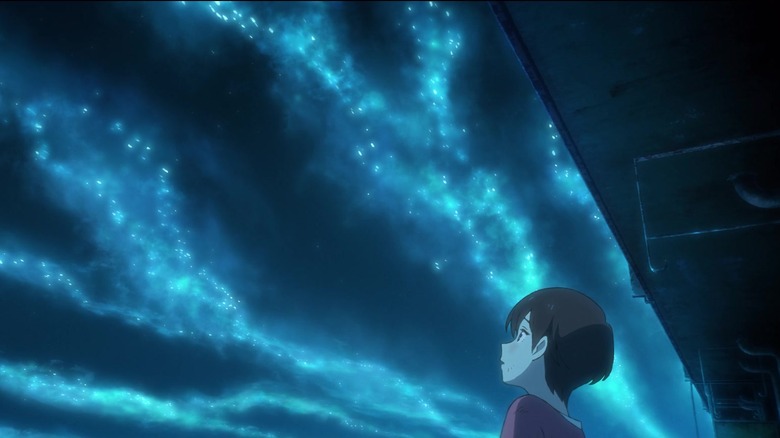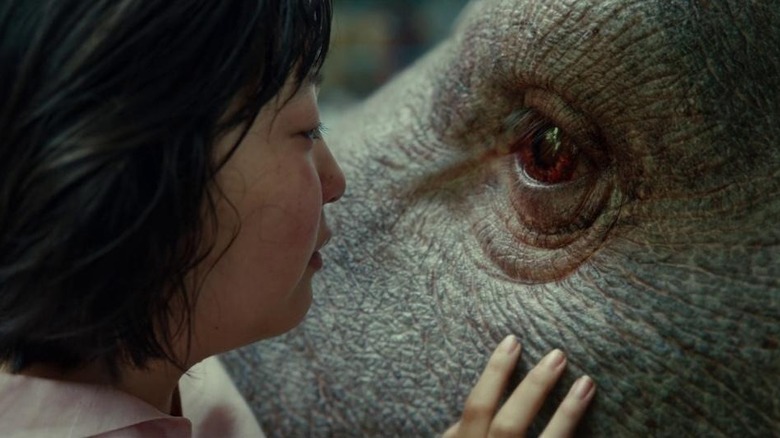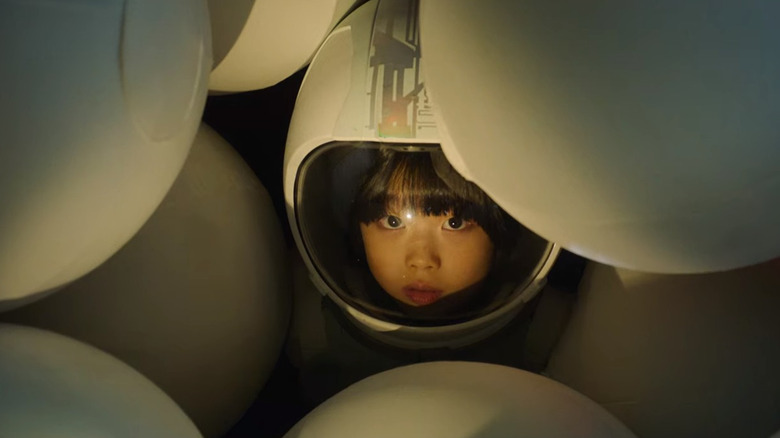Netflix Sci-Fi Movies That Deserve More Attention
There's so much to watch on Netflix that it's tough to know where to start. Curious viewers looking for science fiction genre movies might turn towards established classics like "Blade Runner." They might return to the best superhero movies of all time, "Spider-Man" and "Spider-Man 2." Perhaps they might even bust out "End of Evangelion," the shocking movie climax of the "Neon Genesis Evangelion" television series, just to feel something.
But there's more available on Netflix than just that. The following films include anti-capitalist fables, groundbreaking animated movies, and a Korean science fiction film that overcame the odds to find success. They represent only a taste of Netflix's original offerings in the genre. Rather than blindly follow the streamer's algorithm, sci-fi fans may be better served by bravely plunging into the catalog in search of the unexpected — or letting us curate some selections for you. You may be surprised by what treasures you find along the way.
Okja
Early in "Okja," a young girl named Mija falls from a mountain while taking her giant genetically engineered superpig Okja for a walk. Okja struggles to pull Mija to safety via her rope leash, but is not quite strong enough. Then she sees a nearby stump of wood sticking out of the rock face. With a running start, Okja uses the stump as a fulcrum for the rope leash, throwing Mija to safety as Okja herself falls into the trees. Mija tracks down Okja, who is winded but unharmed on the forest floor, and gives her a big hug. A certain kind of viewer may struggle to suspend disbelief during this scene. Pigs are smart, but are they smart enough to use physics-assisted tools to save people from death? Perhaps not. Yet real life pigs have been observed using tools as of 2019. If pigs are smarter than they are given credit for, what does that say about the people who eat them?
Meat-eating is just one part of "Okja," the film Bong Joon-ho made with Netflix before he took over the world with "Parasite." "Okja" fearlessly mashes together Spielbergian sentiment, expensive special effects, and a blunt but effective satire of corporate politics. Tilda Swinton is there too, returning from a starring turn in Bong's earlier "Snowpiercer" to play a different but equally memorable villain. At the time of its release, the critical consensus was that "Okja" was good but also just a bit too much. Certainly, Bong's Korean language films like "Memories of Murder" and "The Host" remain his best. But don't underestimate "Okja." It perfectly captures the contradictions of late stage capitalism, setting the language of Ted Talks and Whole Foods against the cold, harsh reality of money changing hands from one person to another.
Drifting Home
For the past several years, film critics have been asking: "Who will be the next Studio Ghibli?" Anime fans, of course, know that this question is ridiculous because there will never be another. The studio co-founded by directors Hayao Miyazaki and Isao Takahata, as well as producer Toshio Suzuki, was a historical aberration. No studio in our lifetime may ever replicate their mixture of genius and self-destructiveness, not even its ex-Ghibli-staffed successor, Studio Ponoc. But if we instead ask the question, "What modern anime studio is doing things differently?", there is no better answer than Studio Colorido. Colorido has done a little bit of everything, from original family films to viral McDonalds commercials to arguably the best Pokémon anime ever made. The studio is primed for a break-out hit — the only question is when.
Their latest effort is "Drifting Home," a film about two kids and their friends whose old apartment complex is transported across space and time into a vast ocean. "Drifting" buildings are tales as old as time in Japanese literature, with descendants that include the horrific manga "The Drifting Classroom" and the recent anime drama "Sonny Boy." Director Hiroyasu Ishida, whose past work includes the coming-of-age science fiction film "Penguin Highway," grounds this particular take on the genre in the nostalgia and decay of postwar 1960s danchi apartment complexes. Its young protagonists, Kosuke and Natsume, must learn to leave their childhood haven, even if that means sacrificing something dear to them. There's plenty of striking water imagery as well, as you'd expect from somebody who has contributed to films about penguins and typhoons. "Drifting Home" isn't quite as finely honed as the masterful "Pokémon: Twilight Wings," but as an original film by an exciting and still-evolving studio, it's worth supporting.
The Mitchells vs. The Machines
Sony Pictures Animation was once known as the studio that made "Hotel Transylvania" movies. This is the kind of track record that strikes fear into hearts of animation fans (although those same animation fans would insist, due to Genndy Tartakovsky's input, that the "Hotel Transylvania" films feature groundbreaking CG character animation). But in the beginning, there was "Cloudy With a Chance of Meatballs." Directed by Phil Lord and Chris Miller, it began their string of successes in adapting unexpected source material into popular hits. It also established them as producers who saw animation as a medium rather than a delivery mechanism. Through their influence, a burgeoning "Spider-Man" project at the studio assembled a team of artists looking to break every rule governing CG animation that Pixar had established with "Toy Story" in 1995. The result was "Spider-Man: Into the Spider-Verse," one of the greatest animated movies of all time and Sony Pictures Animation's crowning achievement.
"The Mitchells vs. The Machines" is the studio's first real post-"Spider-Verse" movie, although there is more to the story than that. Director Mike Rianda and writer/co-director Jeff Rowe made their names on "Gravity Falls," an animated series that broke nearly as much ground for Disney as the contemporaneous "Steven Universe" did for Cartoon Network. While "The Mitchells and the Machines" shares the warmth and humor of "Gravity Falls," some may find its well-worn tale of a nuclear family coming together despite their differences to be disappointingly rote. Yet Sony Pictures Animation's efforts are as impressive as ever, enlivening a smaller and more grounded movie with a cornucopia of fun details and techniques. "The Mitchells and the Machines" transcends imploring the audience to "put down their phones" by channeling the protagonist's spirit of goofy, compassionate art-making in every frame.
Space Sweepers
"Space Sweepers" needs no introduction. It overcame the handicap of a theatrical release thwarted by the pandemic lockdowns to become the number one movie on Netflix across sixteen countries. It was praised by film critics like Karen Han and Emma Stefansky. Its story of scrappy junk haulers finding common ground to fight back against corporate overlords steals from other popular science fiction movies and television shows without apology. The film was a calculated risk by director Jo Sung-hee, whose work on animated productions likely proved essential in shepherding the ambitious special effects of "Space Sweepers." But then, "Space Sweepers" also sits comfortably within Netflix's roster of films, evoking half a dozen well-liked classics so Netflix may avoid shelling out expensive licensing fees to secure the rights to those films. Perhaps it is the safest movie a director like Jo Sung-hee could have made.
At the same time, though, it's tough not to root for "Space Sweepers." Despite recent success stories like "Squid Game" and "Extraordinary Attorney Woo," Netflix historically has treated its roster of international television series as fodder rather than the main event. Television critics in the United States have certainly sung the praises of "Dark" and "Babylon Berlin." But what about the deeply nostalgic Korean drama "Reply 1988?" Or the Chinese martial arts series "Word of Honor," an underdog that seized the hearts of fans with its strong characterization and unabashed gay romance? These great series remain niche abroad, while "Space Sweepers" managed to break through Bong Joon-ho's famous "one-inch tall barrier of subtitles" to make headlines. With any luck, audiences will follow the path laid by "Space Sweepers" to discover just how much they've been missing.




